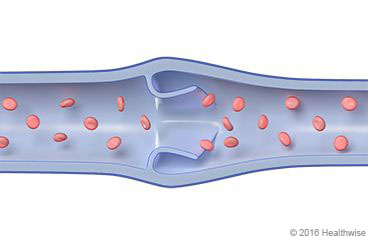Anemia in Children: Care Instructions

Overview
Anemia means that the body does not have enough red blood cells. Without enough red blood cells, your child's body doesn't get enough oxygen. This can cause your child to feel weak or tired. Your child may also find it hard to focus or think clearly.
One common cause of anemia is too little iron. Our bodies need iron to make hemoglobin. This is the substance in red blood cells that carries oxygen from the lungs to the cells.
There are many reasons children don't get enough iron. One reason is too little iron in the diet. Other reasons are bleeding in the intestines and heavy menstrual bleeding. In some cases, inherited diseases cause a lack of iron.
Your doctor will want to find the cause of your child's anemia. It's not always caused by too little iron. But if it is caused by too little iron, your child may need to take iron pills. The doctor may also suggest that your child eat foods that have a lot of iron, such as meat and beans.
It may take several months for your child's iron levels to return to normal. Your child may still need iron pills for a few months after that.
Follow-up care is a key part of your child's treatment and safety. Be sure to make and go to all appointments, and call your doctor or nurse advice line (811 in most provinces and territories) if your child is having problems. It's also a good idea to know your child's test results and keep a list of the medicines your child takes.
How can you care for your child at home?
- Be safe with medicines. Have your child take medicines exactly as prescribed. Call your doctor or nurse advice line if you think your child is having a problem with a medicine.
- If your doctor recommends iron pills, be sure your child takes them as directed:
- Have your child try to take the pills on an empty stomach. Do this about 1 hour before or 2 hours after meals. But your child may need to take iron with food to avoid an upset stomach.
- Do not let your child take antacids or drink milk or anything with caffeine within 2 hours of when your child takes iron. They can keep the body from absorbing the iron well.
- Vitamin C may help the body absorb iron. Some people have their child take iron pills with a glass of orange juice or some other food high in vitamin C.
- Iron pills may cause stomach problems. These include heartburn, nausea, diarrhea, constipation, and cramps. It can help if your child drinks plenty of fluids. It can also help if your child includes fruits, vegetables, and fibre in their diet.
- It's normal for iron pills to make your child's stool a greenish or greyish black. But internal bleeding can also cause dark stool. So it's important to tell your doctor about any colour changes.
- If your child misses an iron pill, do not give a double dose next time.
- Keep iron pills out of the reach of small children. Too much iron can be very dangerous.
- Your doctor may recommend giving your child more iron-rich foods. These include red meat, poultry, and eggs. They also include beans, raisins, iron-fortified cereals, whole grain bread, and leafy green vegetables.
When should you call for help?
Call 911 anytime you think your child may need emergency care. For example, call if:
- Your child passes out (loses consciousness).
- Your child has severe shortness of breath.
Call your doctor or nurse advice line now or seek immediate medical care if:
- Your child has new or increased shortness of breath.
- Your child is dizzy or light-headed, or feels about to faint.
- Your child has new or worse nausea and vomiting.
- Your child's fatigue and weakness continue or get worse.
- Your child has any abnormal bleeding, such as:
- Nosebleeds.
- Bloody or black stools or rectal bleeding.
- Bloody or pink urine.
Watch closely for changes in your child's health, and be sure to contact your doctor or nurse advice line if:
- Your child does not get better as expected.
Where can you learn more?
Go to https://www.healthwise.net/patientEd
Enter X617 in the search box to learn more about "Anemia in Children: Care Instructions".
Current as of: October 7, 2024
